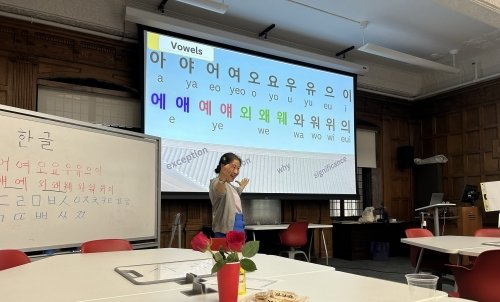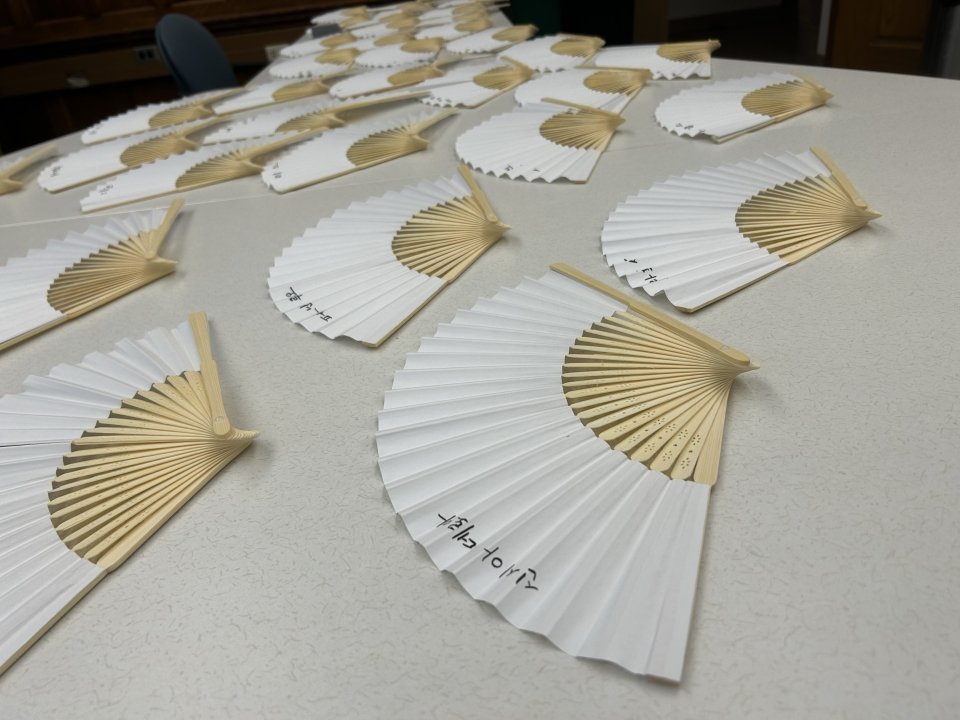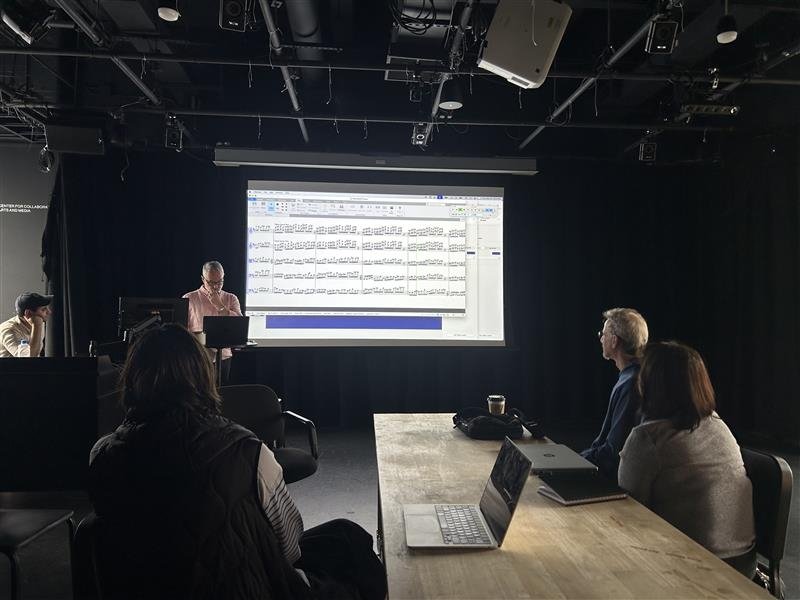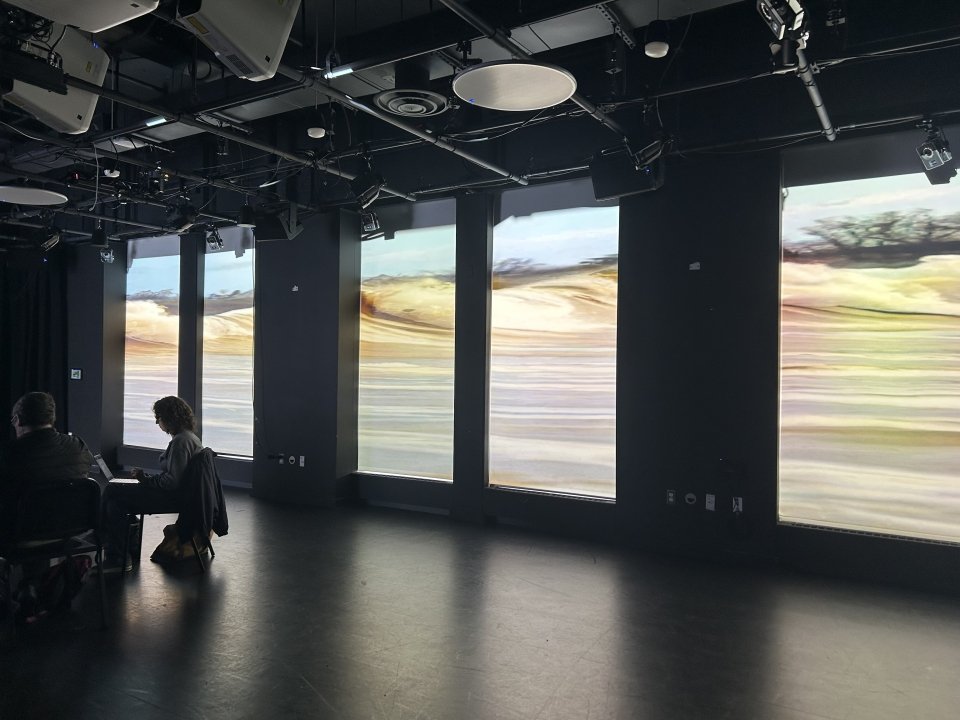FAS faculty learn Korean, rocket science, and more in summer courses
Faculty Academy, offered by the FAS Dean’s Office SAL2 program, gives FAS faculty the opportunity to teach and take courses with their academic peers.

Angela Lee-Smith teaching her mini-course, “You Can Learn to Read Korean Over Lunch – Really!” Photo credit: Michaela Herrmann.
At the end of each academic year, FAS faculty might find themselves on the other side of the lectern, sitting in a classroom as students. After a long year of teaching, grading, and research, many find themselves eager to learn something new.
Faculty Academy workshops and mini-courses are short, non-credit offerings taught by FAS faculty members, for FAS faculty members.
Faculty Academy is a core offering of Scholars as Leaders; Scholars as Learners (SAL2), a program offered by the FAS Dean’s Office that supports FAS faculty members in their continuing growth as scholars, leaders, and university citizens at Yale.
Since its inception in 2018, Faculty Academy has proven to be a fun and refreshing way for FAS faculty to connect with each other while exploring new or different academic fields.
This spring, FAS faculty taught six courses from disciplines across the humanities, social sciences, and sciences. In courses on Korean, reproductive politics, rocket science and beyond, faculty built community by teaching and learning alongside one another.
“I’m deeply grateful for this opportunity the FAS has cultivated,” said Angela Lee-Smith, a Senior Lector II in East Asian Languages and Literatures who taught one of this spring’s courses. “I had the chance to meet colleagues from across disciplines—people I wouldn’t normally encounter in my day-to-day teaching. Each participant brought genuine curiosity, enthusiasm, and a spirit of respect and appreciation.”
Learning Korean over lunch
Is it possible to learn Korean in just an hour and a half? Over a light lunch, Angela Lee-Smith taught fellow FAS faculty the basics of reading and speaking Korean, lighting up the room with participation and collaboration.
A Senior Lector II in East Asian Languages and Literatures, Lee-Smith's 22 years of teaching were evident in her infectious energy and humor. She introduced the group to “Hangeul,” the Korean language’s alphabet, and patiently led the group through the pronunciation of characters for vowels, compound diphthong vowels, and consonants.
“I didn’t originally intend to teach my colleagues in a traditional sense,” said Lee-Smith of the mini-course. “What I wanted was to share a small part of Korean daily culture with them—something they could recognize and enjoy in their own lives, like reading a K-dish name on a menu, a K-drama title, or a K-film poster.”

Small groups worked together to translate snippets of text alongside familiar images: iced coffee (아이스 커피), Korean bibimbap (비빔밥) and Yale’s own mascot, Handsome Dan (핸섬 댄).
Lee-Smith concluded the class with a creative, thoughtful touch: a paper fan for each participant, labeled with their name written in Korean. “My hope was that this casual introduction to Hangeul might spark further interest,” she said. “Over time, these personal connections to Korean culture could enrich not only their everyday lives but also, perhaps, intersect meaningfully with their own areas of research or teaching.
"I really felt ‘community’ from this course – community of learning!” said one participant. “Seeing other faculty in action energizes my own teaching,” added another. “This was a delightful opportunity to learn Hangeul and meet colleagues across Yale.”
Rocket Science 101
The idea that rocket science impacts our everyday lives may sound far-fetched, but Marla Geha’s two-day mini-course proved otherwise.
Geha, Professor of Astronomy and of Physics, adapted her Faculty Academy course “Rocket Science 101” from a Yale College astrophysics course she teaches for non-science majors.
She introduced colleagues to Earth's common orbits, described how satellites are launched into orbit, and explained the important role these satellites play in our day-to-day existence.
“Satellites are embedded in our lives even more deeply than perhaps is obvious when you're using GPS on your phone,” Geha explained, pointing out that GPS is also used for complex, critical processes like crop planting and managing the electrical grid.
Geha also gave colleagues a brief snapshot into her own research, sharing the proposal and process for requesting orbits from the Hubble Space Telescope to conduct some of her research on the formation, evolution, and destruction of dwarf galaxies.
After learning about orbits and satellites, the group worked together to make a scale model of Earth’s orbits, the Moon, and Mars. The playful modeling exercise illustrated just how close these orbits are to Earth’s surface – and why getting all the way to Mars is so logistically complex.
One attendee, Jospeh Wolenski, Senior Lecturer II and Research Scientist in Molecular, Cellular and Developmental Biology, said he enjoyed learning about the use of GPS to assist farmers with planting their fields, and was interested in satellites’ integral role in national security. “Professor Geha communicates difficult concepts in rocket science using succinct analogies to everyday science,” he said of Geha’s course.
As class wrapped up, Geha encouraged those eager to learn more to watch her popular course “Rocket Science for Everyone,” a free-to-all, self-paced online class offered via Yale Online. “I get emails from across the world from students saying that the course was a clear and inspiring introduction to rocket science.”
Politics of reproduction
This spring’s most in-depth Faculty Academy offering was “The Politics of Reproduction,” a four-part, seminar-style mini-course taught by Rene Almeling, Professor of Sociology.
With participants from economics, political science, law, history, and epidemiology, the seminar allowed colleagues from a variety of disciplines to compare how academia, medicine, and society conceive of reproduction from conception and pregnancy through birth.
The seminar was adapted from Almeling’s immensely popular Yale College course of the same name and introduced participants to topics including the history of medical interventions into reproduction, markets for assisted reproduction, and the consequences of non-knowledge—for example, the dearth of research on male reproductive health.
The syllabus also evolved on the fly in response to her fellow faculty members’ own research interests, and the group ended up exploring in depth how reproductive care has been “medicalized” over time, as well as how people’s reproductive choices are being affected by climate change.
Andrea Aldrich, a Lecturer in the department of Political Science who researches and teaches courses on political representation, gender, and comparative political institutions, said she enjoyed the opportunity to learn about gender and politics from a new perspective. “I don't teach anything about reproductive politics in my course on gender and politics, and I feel like it's missing,” she said. “I thought this might give me more knowledge and slightly more authority to be able to incorporate that into my classes.”
Simply having the time to connect with other colleagues to discuss new material was also a highlight of the seminar for Aldrich. “I really enjoyed making space to read new material and discuss new material in a way that I don't have a lot of time for during the normal academic year,” she added.
Almeling herself felt that teaching the mini-course had been a valuable way to connect with FAS colleagues. “I really enjoyed being in conversation with faculty from across campus,” she said. “They provided new perspectives on material I teach every year, and I think I learned just as much from my 'students' as they did from me.”
Making the invisible audible
If distant galaxies could make music, how would it sound? Composer and Senior Lecturer in Theater, Dance, and Performance Studies Matthew Suttor helped the faculty in his mini-course find out.
Suttor offered a three-day version of a course he taught for Yale College students this spring, "Nature, AI, and Performance: Making the Invisible Audible." Faculty brought photographs, datasets, and audio recordings of nature to be transformed into musical notes using AI-powered software.

David Rabinowitz, Senior Research Scientist in Physics, brought data related to his research on the evolution and expansion of galaxies and the explosions of supernovae. By studying the expansion of galaxies, he told the group, we can learn about the accelerating expansion of the universe.
A real-time experiment in collaborative music-making, the 46,000-line dataset generated a fascinating, subtle collection of sounds: some oscillating frequently over a small range of notes (representing the varying brightness of different supernovae in the sky), and others making a steady droning noise (representing an “error” column in the dataset, which conveys the increasing uncertainty of observations made of supernovae as they are made further away).
“I always thought that maybe we could learn something from the expansion of galaxies if we could hear it,” Rabinowitz said of his data’s new, musical format.

Other participants made music drawn from the leaves of “mother-of-thousands plants,” the collision of the Atlantic Ocean with the Amazon River (known as “pororoca” in Portuguese), and vibrations created by elephants protectively surrounding their young during an earthquake.
“While I hope participants find something useful in my work, I’m just as eager to learn from their perspectives,” said Suttor. “That spirit of reciprocity is what makes the Faculty Academy so remarkable.”